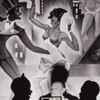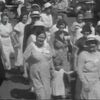

Playlist: HIST 3678: Week Eight, Depression Culture by Kathleen Saylor, Alexander Street Press
This playlist examines some of the hardships that people endured during the great depression, including a variety of opinions on the Dust Bowl. It also presents the different ways in which corporations dealt with their employees during rough times.
Sorry, due to rights restrictions, some of the items in this playlist are unavailable to you.
Format
Artwork
Title
Notes
Duration / Pages
Date added
America in the 20th Century, 6, The Great Depression
produced by Media Rich Communications, in America in the 20th Century, 6 (Chesterton, IN: Media Rich Learning, 2004), 27 mins
It was called “Black Tuesday” - the day the bottom fell out of the stock market ushering in the Great Depression. Soon, soup kitchens and breadlines replaced the flappers and speakeasies of the Roaring Twenties. A new president, Franklin D. Roosevelt, provided hope and leadership in the country's darkest hour.
27:08
31 Oct 2014
Discussion of Eleanor Roosevelt's Work for Social Causes During the Great Depression
directed by Harry Rasky, 1928-2007; produced by Harry Rasky, 1928-2007; in Eleanor Roosevelt: A Restless Spirit, Biography (New York, NY: A&E Television Networks, 2005, originally published 1994, first release 1994), 3 mins
The work Eleanor Roosevelt was happiest doing was helping those who could not help themselves and as First Lady, she constantly used her power and influence to expose inequities and stimulate public concern. She found them shocking and depressing and reported her findings in her "My Day" column.
02:55
31 Oct 2014
Black American and the Great Depression
written by Ken Burns, 1953-; directed by Ken Burns, 1953-; produced by Ken Burns, 1953-, in Ken Burns's Jazz, 4 (Arlington, VA: Public Broadcasting Service, 2000), 1 hour 59 mins
Hard times hit Black America hardest, and the optimism and entrepreneurial spirit that had been at the heart of the Harlem Renaissance collapsed almost completely. But the people of Harlem endured. And from that rose Jazz greats including Louis Armstrong and Duke Ellington.
07:33
31 Oct 2014
The Plow That Broke The Plains
directed by Pare Lorentz, 1905-1992 (District of Columbia: United States. Resettlement Administration, 1936), 25 mins
This film presents the social and economic history of the Great Plains -- from the time of the settlement of the prairies, through the World War I boom, to the years of depression and drought. The first part of the film shows cattle as they grazed on grasslands, and homesteaders who hurried onto the plains and grew large wheat crops. The second part depicts the postwar decline of the wheat market, which resulted in overproduction. Footage shows farm equipment used, then abandoned. The third part shows a dust storm as it rendered a farm useless. Subsequent scenes show farmers as they left their homes and headed west.
25:29
31 Oct 2014
Rain for the Earth
produced by United States. Work Projects Administration (District of Columbia: United States. Work Projects Administration, 1937), 10 mins
This documentary, produced by the Works Projects Administration, features drought in the Dust Bowl and efforts to combat it.
09:57
31 Oct 2014
Southern Cotton Mills During the Great Depression and the New Deal
directed by Susanne Rostock, fl. 1989, Judith Helfand, fl. 1983-2016 and George C. Stoney, 1916-2012 (Watertown, MA: Documentary Educational Resources (DER), 1995), 1 hour 27 mins
The Cotton Mills of the South experienced a downturn years before the Great Depression hit. When Franklin Roosevelt was elected, may looked to him and listened eagerly to his fireside chats to hear if the "good days" were truly here again. Some of the key FDR initiatives that affected the Southern Cotton Mills were the National Industrial Recovery Administration, minimum wage, 40-hour work week, and Section 7A in regards to unions.
09:40
31 Oct 2014
Delete playlist item?






